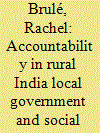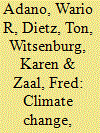| Srl | Item |
| 1 |
ID:
142599


|
|
|
|
|
| Summary/Abstract |
This article studies variation in individuals’ perceived ability across India to hold local officials accountable for their performance. It finds significant gender differences in accountability perceptions, consistent with traditional social institutions. Exposure to progressive institutions of education and labor mobility is associated with the elimination and reversal of gender differences.
|
|
|
|
|
|
|
|
|
|
|
|
|
|
|
|
| 2 |
ID:
110806


|
|
|
|
|
| Publication |
2012.
|
| Summary/Abstract |
Many regions that are endowed with scarce natural resources such as arable land and water, and which are remote from a central government, suffer from violence and ethnic strife. A number of studies have looked at the convergence of economic, political and ecological marginality in several African countries. However, there is limited empirical study on the role of violence in pastoral livelihoods across ecological and geographical locations. Yet, case studies focusing on livelihood and poverty issues could inform us about violent behaviour as collective action or as individual decisions, and to what extent such decisions are informed or explained by specific climatic conditions. Several case studies point out that violence is indeed an enacted behaviour, rooted in culture and an accepted form of interaction. This article critically discusses the relevance of geographical and climatic parameters in explaining the connection between poverty and violent conflicts in Kenya's pastoral areas. These issues are considered vis-à-vis the role institutional arrangements play in preventing violent conflict over natural resources from occurring or getting out of hand. The article uses long-term historical data, archival information and a number of fieldwork sources. The results indicate that the context of violence does not deny its agency in explanation of conflicts, but the institutional set-up may ultimately explain the occurrence of the resource curse.
|
|
|
|
|
|
|
|
|
|
|
|
|
|
|
|